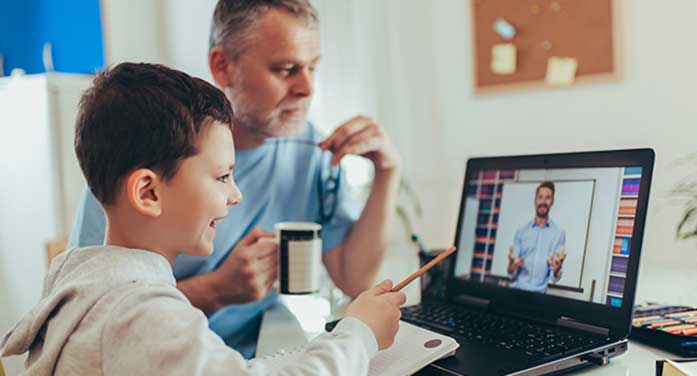The COVID-19 pandemic caused major upheaval, sending students home to remote learning and leaving teachers and parents scrambling to adapt.
But it also created the opportunity for a deeper appreciation of their respective roles and challenges, according to a study led by a University of Alberta researcher.
“It afforded everyone the chance to understand what others were going through,” said Bonnie Stelmach, a professor of educational policy studies in the Faculty of Education. “There were realizations from both groups about the others’ circumstances.”
Whether it was teachers witnessing parents deal with pandemic-caused stresses like job loss, or parents struggling to help their children with at-home lessons, the situations people found themselves in gave everyone a chance to empathize, Stelmach said.
A web-based survey of 1,067 parents and 566 teachers, along with 10 parents and 10 teachers who were individually interviewed, revealed greater empathy and patience from both sides.
Forty-five percent of parents reported an increased understanding of the demands on teachers, while 74 percent of teachers reported they now knew their students’ families better.
However, the study also showed that even as the pandemic strengthened some relationships, it strained others.
Forty-three percent of parents reported lower interaction with teachers, and only 18 percent reported improvements in their relationships with teachers.
The pandemic unearthed some key contributing assumptions, Stelmach noted.
One of the main observations was how students learning online viewed their teachers as having more status than their parents.
Some parents noted their children wouldn’t do assigned work for them unless a teacher was onscreen, Stelmach noted.
“Teachers have a professional authority that kids recognize.
“While it may be true that parents know their kids best, they don’t necessarily know their children as learners. They got to watch their children for the first time with remote teaching, and that’s when they saw the real struggle. A parent’s role does not equate to the role of a teacher.”
Conversely, teachers “can’t assume that an assignment will just get done at home,” she added. If children were reluctant to do the work, many parents wanted to avoid arguing with them.
“That’s not about parents being neglectful or combative about helping out with their child’s lessons. It means that keeping harmony in the family trumps what happens from school. School was taking on new life in the family, and some of them found that very stressful. Parents had their limits.”
Teachers and parents may want to have a conversation about the parent-child or family dynamic to determine how parents can play a supportive role in their children’s learning, Stelmach suggested.
Why remote learning takes new ways of thinking by Bev Betkowski
“Assigning homework that demands a parent be part of it doesn’t work for everyone, and it may be worthwhile for teachers to make such things optional.”
Going virtual also provided a new way for parents and teachers to connect about a student’s progress during the pandemic, beyond traditional report cards and twice-yearly interviews, said Stelmach. Several survey respondents noted that having to connect with teachers online resulted in more frequent and meaningful communication.
It’s a practice that could continue to be beneficial, she suggested.
“Some parents may feel the virtual space is more convenient and timely to ask more questions and seek more clarification, so maybe the parent-teacher interview doesn’t need to happen in a school, but could be more impromptu.”
A better mutual understanding of the dynamics of the parent-teacher relationship will help strengthen it as children return to class this fall – and in the event of further lockdowns, Stelmach believes.
“What goes on at school can affect family life, and what goes on within families can impact a student’s school life, so it matters that there is willingness on both sides to understand this. If we have another lockdown, everyone will be much more equipped to respond, because we now have new perspectives on the teacher versus the parent role that can be a starting point.
“When something does go wrong, you are more likely to be able to work it out in a better way.”
Doctoral student Rita Lau’s work on the study was funded by the Alberta School Councils’ Association.
| By Bev Betkowski
This article was submitted by the University of Alberta’s Folio online magazine. The University of Alberta is a Troy Media Editorial Content Provider Partner.
© Troy Media
Troy Media is an editorial content provider to media outlets and its own hosted community news outlets across Canada.



